OUR BURNING PLANET
Dark days ahead: A bleak future awaits future generations if world leaders and industries continue to ignore climate crisis
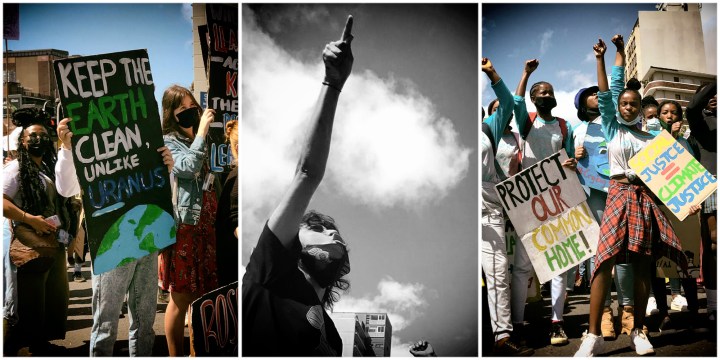
You’ve heard it all before. Climate crisis. Global warming. 1.5°C threshold. Tipping point. Day Zero. But what does any of it mean in practical terms? What is going to happen to us 10, 20 or 30 years down the line?
As part of their #CancelCoal campaign, the Centre for Environmental Rights (CER), the African Climate Alliance, groundWork and the Vukani Environmental Movement in Action commissioned two reports by climate experts Nicholas King and Francois Engelbrecht that looked at what South Africa will be like over the next 50 years if we continue with a business-as-usual approach to climate change.
The reports highlight how the children of today, and future generations, will bear the brunt of the effects of climate change.

‘I should be living my life, going to school, being with friends, but instead like many I have to fight for my future,’ says youth activist Yola Mgogwana. (Photo: Faithful to Nature)
Yola Mgogwana, a 13-year-old climate activist from Khayelitsha, said at the virtual launch of the reports on Tuesday, “I should be living my life, going to school, being with friends, but instead, like many, I have to fight for my future.
“The older generation has ripped an irreparable hole in the ozone layer, yet we are the ones who are facing the most impacts.”
Dr Francois Engelbrecht, professor of climatology and lead author on several Intergovernmental Panel on Climate Change (IPCC) reports, co-authored the report with the late Robert Scholes. It considered climate impacts in the southern African region in the 21st century.
The report found that global warming is estimated to have increased by 1.1°C for the period 2011-2020, relative to the period 1850-1900.
And we aren’t stopping there. The report states, “the climate will continue to change throughout the 21st century, to a degree mostly determined by human actions and the policies that guide them”.
What does this mean?
Engelbrecht’s report finds that in a future where global warming exceeds 3°C, we face much higher risks than a future that limits global warming to 1.5°C or even 2°C above pre-industrial levels. But if we were to reach the latter futures, it would require urgent and immense effort to reduce greenhouse gases.
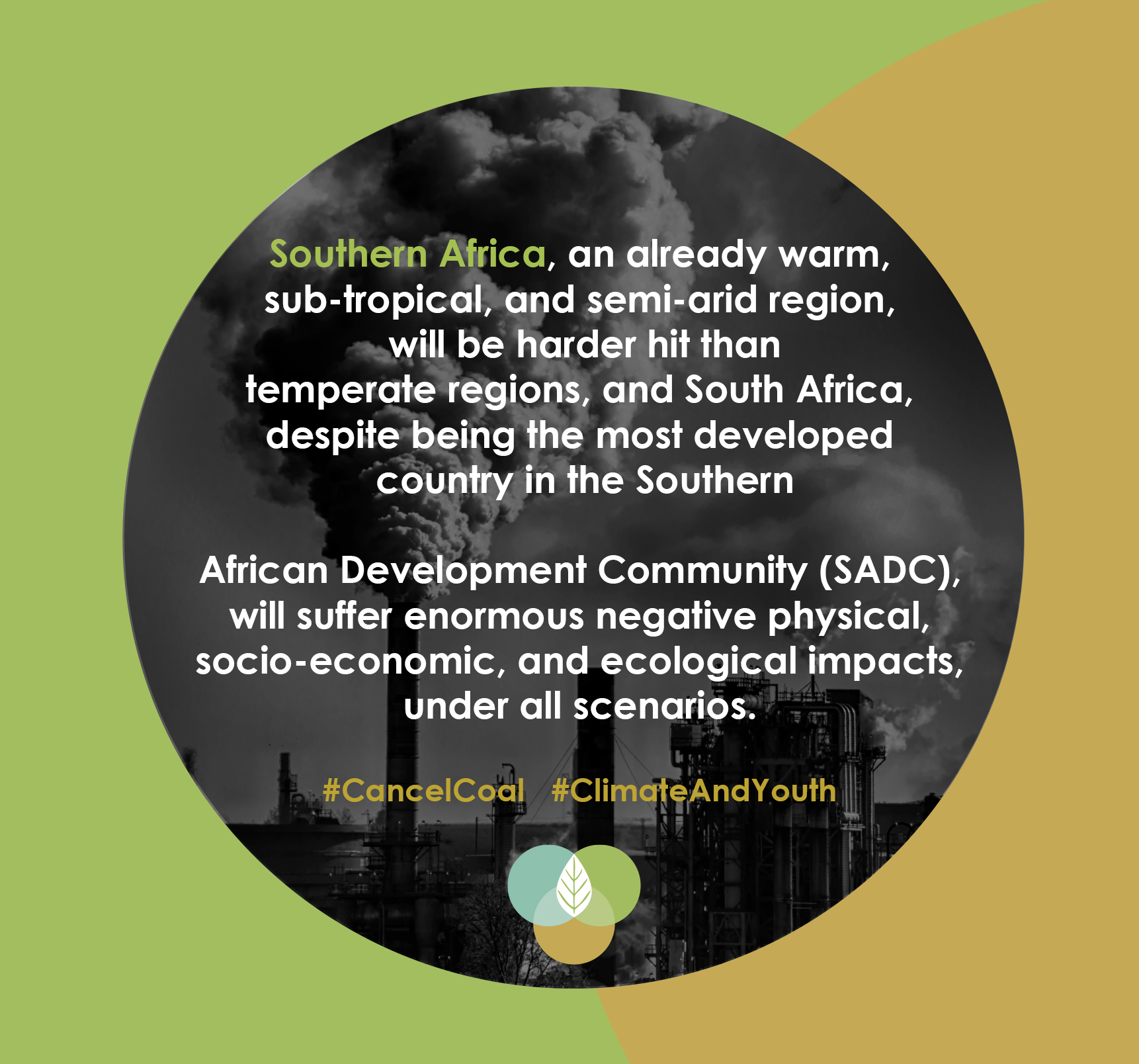
(Image: The Centre for Environmental Rights)
Additionally, it’s important to consider that South Africa is especially vulnerable to climate change because warming in the interior of southern Africa is occurring at about twice the global average.
Engelbrecht said during the virtual launch, “the real reason why these temperature thresholds are thought to be dangerous is because they define what is known as ‘global tipping points’ in the earth’s system. So this report assesses that the possibility exists, that between 1.5 and 2°C of global warming, we may trigger the irreversible melting of both the Greenland and West Antarctic ice sheets.
“Which means our generation is committing future generations to a different planet, a different coastline. A smaller planet, one can say, with less living space.”
Engelbrecht presents two futures: one that remains dependent on fossil fuels as the main source of energy through the 21st century. And the opposite — where there are massive cuts in emissions, starting immediately, achieving net zero carbon dioxide emission by 2050.
“These are, of course, extremely different, completely diverse possible futures. And as we are meeting here today, it is still humanity’s choice which pathway we will be taking.”
So, what would our future hold if not enough changes are made?
Global change expert Prof Nicholas King authored a report that considered what basic lifestyles and services will look like under climate change impacts for future generations by 2030, 2040 and beyond.
King’s report emphasises how the effects of climate change will significantly alter the lives of today’s and tomorrow’s youth.
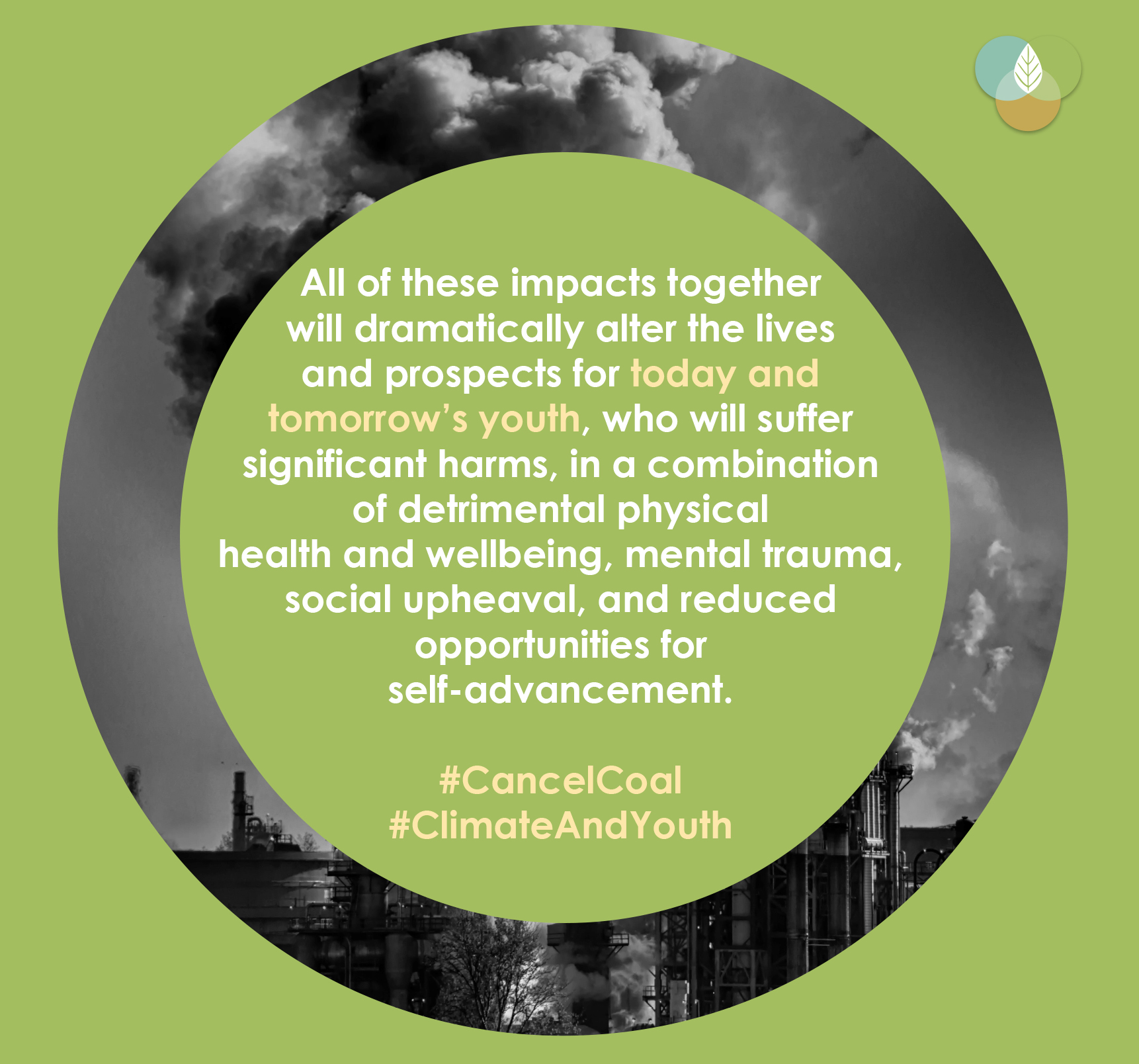
(Image: The Centre for Environmental Rights)
“[Young] generations are currently being abandoned, basically, by today’s adults, the leaders, the people they trust, to face a range of increasingly severe impacts caused by climate change,” said King during the virtual launch.
“Their daily lives will be vastly more difficult, [their] quality of life and economic opportunities… and many will suffer premature death from any of extreme weather events, stress, exacerbated disease outbreaks and/or violent social upheaval and conflict. As well as what is becoming increasingly apparent… stress-induced suicide with the hopelessness of seeing no future for themselves.”
These are some of the main things that will disproportionately affect the youth and future generations to come.
Access to freshwater
Freshwater availability and quality will significantly affect the children of today and future generations.
King said during the launch, “South Africa is already a semi-arid country, access to water and sanitation is already highly problematic, particularly with things like collapsing sanitation infrastructure.
“And we already have problems with poor water quality, where, for example, diarrhoea is already the biggest killer of under five-year-olds in South Africa.”
Engelbrecht’s report states, “Freshwater availability, already critically limited in southern Africa, will be reduced in future as a result of decreasing rainfall and increasing evaporation. These impacts will amplify as the level of global warming increases. Water quality also decreases in a warmer, drier southern Africa, increasing the risk of water-borne diseases.”
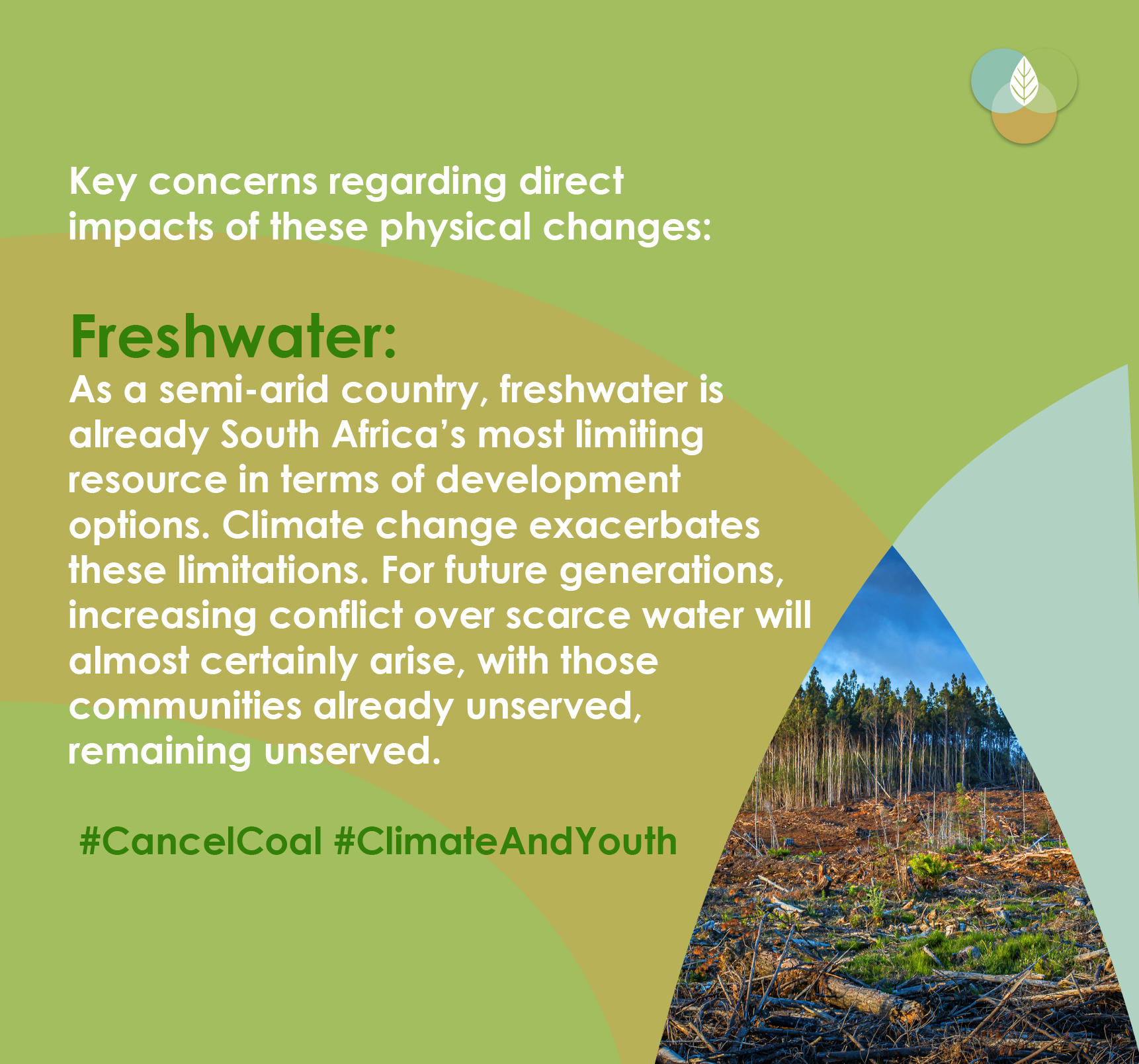
(Image: The Centre for Environmental Rights)
King’s report says that “with ongoing rising temperatures and drought conditions, it is virtually certain that these events will collapse crop production, kill livestock and greatly exacerbate food insecurity”.
The report found that limited access to freshwater would have negative impacts on girls and women. As they are traditionally tasked with fetching water for their family, they will have to spend more time sourcing and fetching water as a result.
“And there are a whole bunch of negative impacts associated there too, for women and the girls — missed schooling for the girls, being out of class.”
In the Western Cape between 2021 and 2040, King’s report predicts that residents from burgeoning informal settlements such as Khayelitsha will spend much of their days waiting in queues at standpipes or paying inflated prices for water from tankers.
Young activist Yola Mgogwana said during the virtual launch, “Currently in Khayelitsha, drains are blocked and we are literally swimming in sewage. I already fetch water from a communal tap and use the bucket system which leaves people like me exposed to dangers and gender-based violence.”
Finally, King’s report predicts food preparation, general hygiene and sanitation will become more difficult, affecting children’s health, their ability to attend school and their development.
Food security
Engelbrecht’s report finds, “A high likelihood that agricultural production in southern Africa, including staple crops and livestock, will be reduced relative to the no-climate-change case.
“This is because the region is already beyond the temperature optimum for most crop and livestock production, and crop and forage production in an already dry country decreases if soil moisture decreases further.”
For example, in Limpopo, King’s report predicts that this province will no longer be able to depend on rain-fed agriculture and rangeland grazing for livestock. The report says that “food insecurity will very likely quickly become a major cause of socio-economic stress. Commercial farmers will likely struggle to obtain sufficient irrigation water, and conflict over water use and allocations will rise”.
Heat and ability to work outdoors
King said, “Heat stress, with rising temperatures, will make working outdoors — field labour, agricultural labour — simply untenable for most of the year, and with reduced hours… This will have severe consequences for rural livelihoods for subsistence farmers, but also for commercial farmers and all other external workers and labourers. Farming communities are those being hardest hit at the moment, with the least ability to mitigate these impacts.”
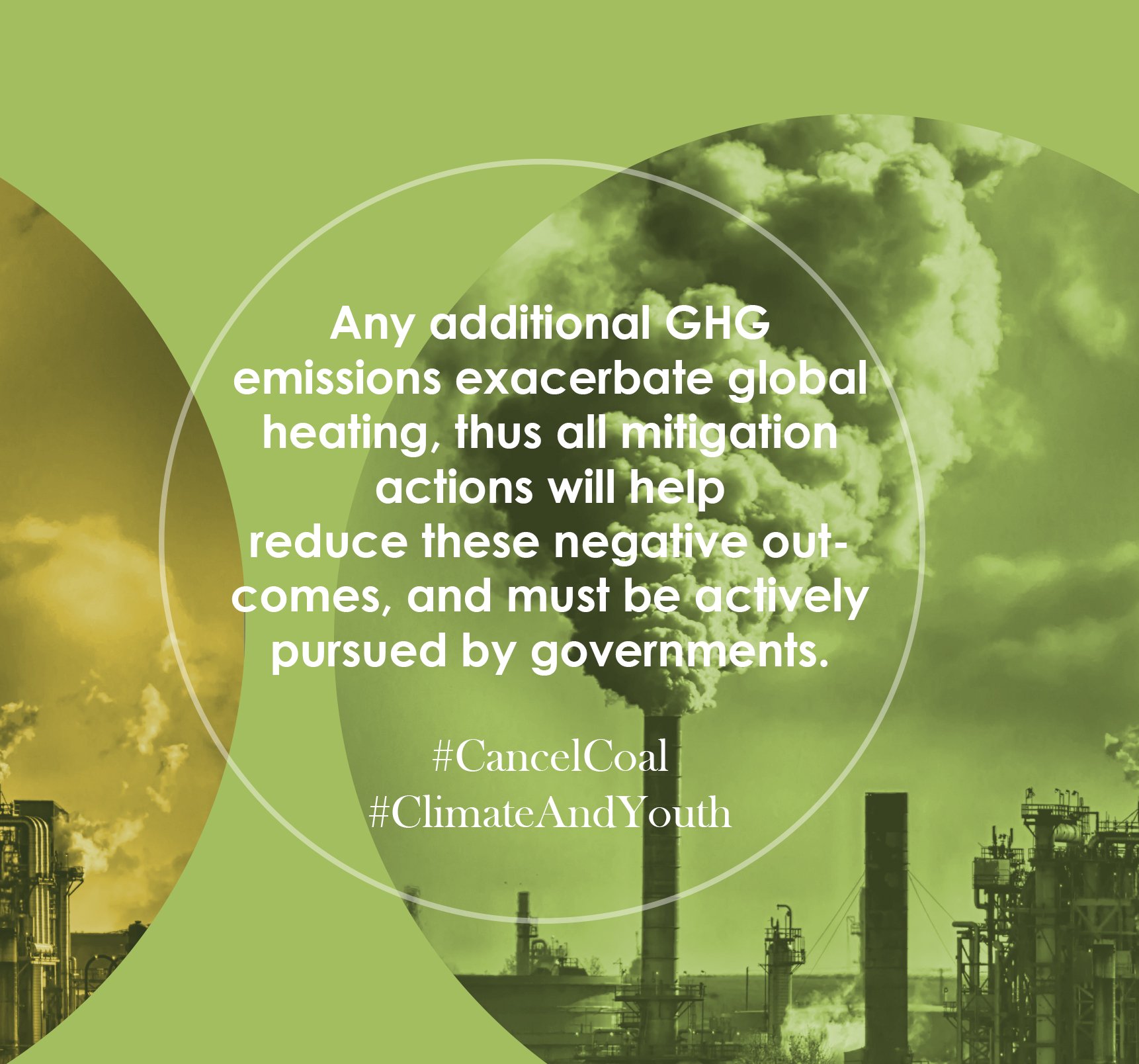
(Image: The Centre for Environmental Rights)
King’s report predicts that in Limpopo, between 2041 and 2060, temperatures will increase to the point that it will “almost certainly be too hot to work outdoors for most of the year, curtailing almost all agricultural fieldwork and manual labour”.
Engelbrecht’s report says, “The number, intensity and duration of heat waves in South Africa will increase steeply in future as a result of global warming. The capacity to perform manual labour out of doors decreases dramatically as the occurrence of heat waves increases. Human mortality increases, particularly in urban areas with inadequate housing, but may in some locations be offset by decreases in mortality as a result of fewer cold spells.”
Emotional wellbeing
King says the physical, social, economic and cultural disruption that the effects of climate change causes will have a significant impact on children’s emotional wellbeing.
Many families will be forced to migrate due to the effects of climate change and a collapsing economy.
“Forced migrations will also lead to the loss of spatial and cultural identities for people in the regions where they’ve grown up,” says King. He says moving to informal settlements in unfamiliar geographic regions “will be especially traumatic for children who will be losing everything that is familiar to them, often displaced from family units.
“Currently, climate disasters have caused more internal displacement than war for one of the first times, with over 30 million people being displaced last year, globally. And a large proportion of those are in southern Africa, as we mentioned, the cyclones in Mozambique.”
King adds that the “increasing inability to cope with climate impacts, and the knowledge that government services are overwhelmed and literally unable to help most people, will create feelings of abandonment, hopelessness and depression amongst a growing proportion of the population as they feel basically betrayed by those who should be securing their safety and their future”.
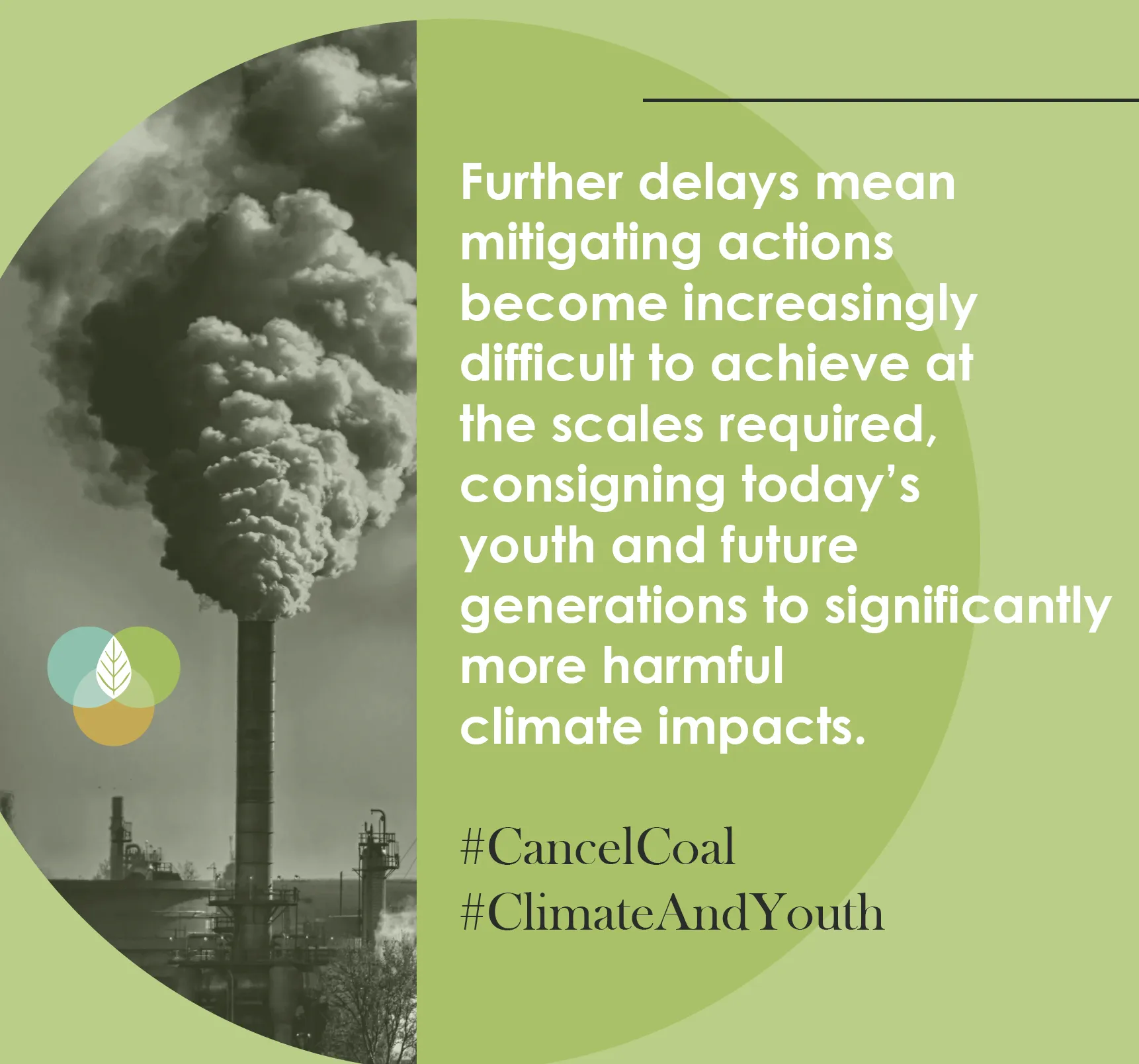
(Image: The Centre for Environmental Rights)
Teenager Yola Mgogwana said, “we are not (being) taken seriously by the government and decision makers. Our voices are used as tokens. But we are not your tokens… we are taking action today and all days to come”.
If we want to avoid these most dangerous impacts of climate change, what should we do?
Children were suffering the most, said King. “Intergenerational inequity will rapidly increase without a transformational change in our energy policy right now, and within a global energy policy based essentially on no new fossil fuel investments and rapid phase-out of all existing fossils”.
Engelbrecht presented the International Energy Agency report that came out in May this year, which estimated that South Africa will need an annual investment in alternative forms of energy (mostly renewables) of about $5-trillion from 2030 to 2050, to achieve the net zero emissions reduction target by 2050.
Engelbrecht added that the IPCC 2018 report had similar estimations.
“These are massive investments,” says Engelbrecht, “and there may well of course be costs to economies in the short term. But overall, the International Energy Agency estimated that this investment in renewables may well result in adding about 0.4% growth to the annual global GDP during this period of the transition, so there are also immense economic opportunities in pursuing this transition.” DM/OBP
[hearken id=”daily-maverick/8738″]










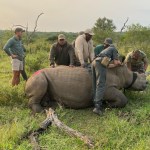








 Become an Insider
Become an Insider
Once again climate change commentators evade mentioning the primary cause of pollution and global warming – overpopulation. Africa’s population is growing by 30 million a year, and that increase increases to 46 million in 2050. (see United Nations population forecasts).
If these reports on global warming are correct, then food production will suffer in the future. We have a choice – Limit population growth voluntarily, or have nature impose a cruel solution on us.
The choice is ours, but politicians, and others, refuse to mention the problem.